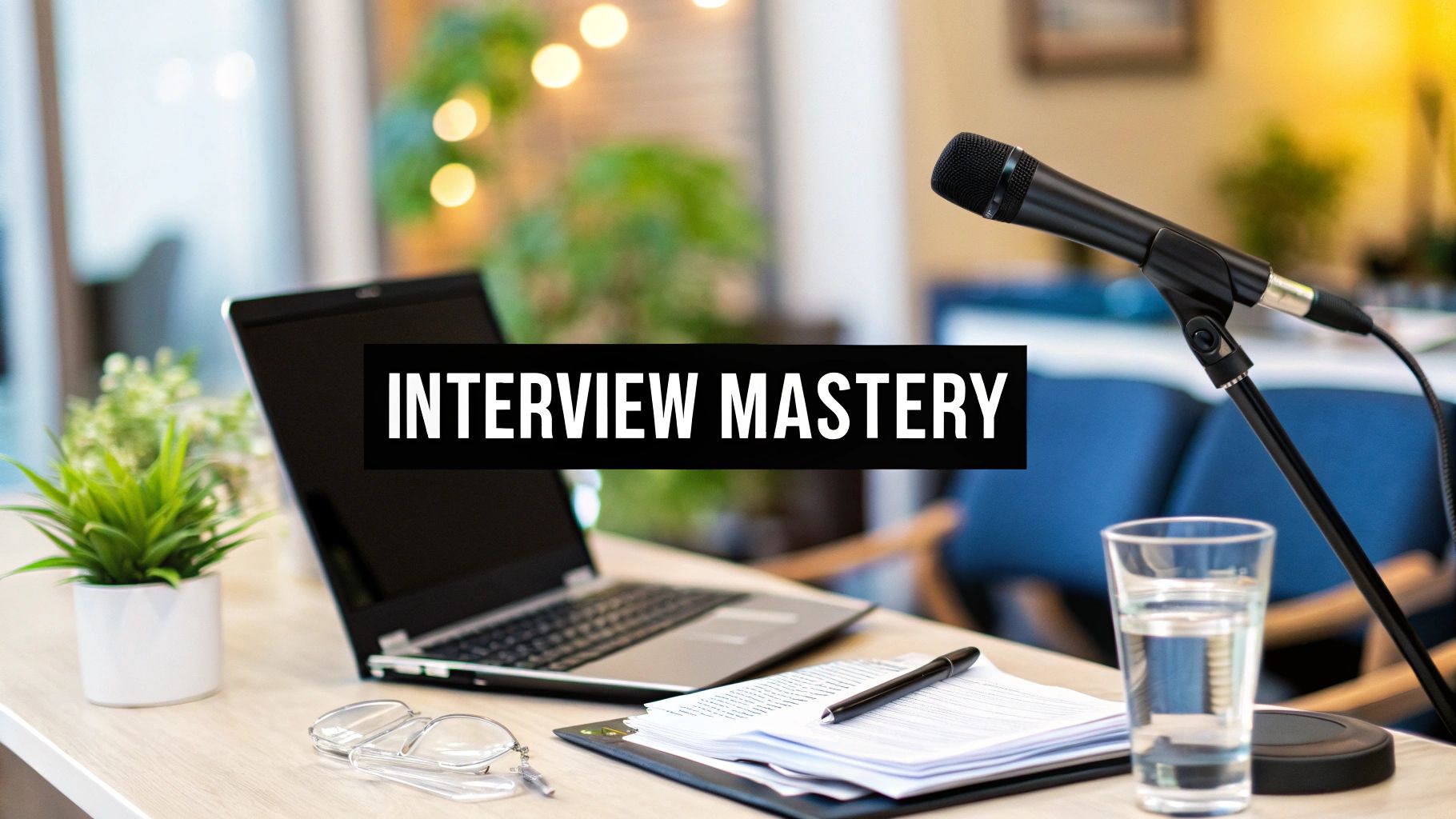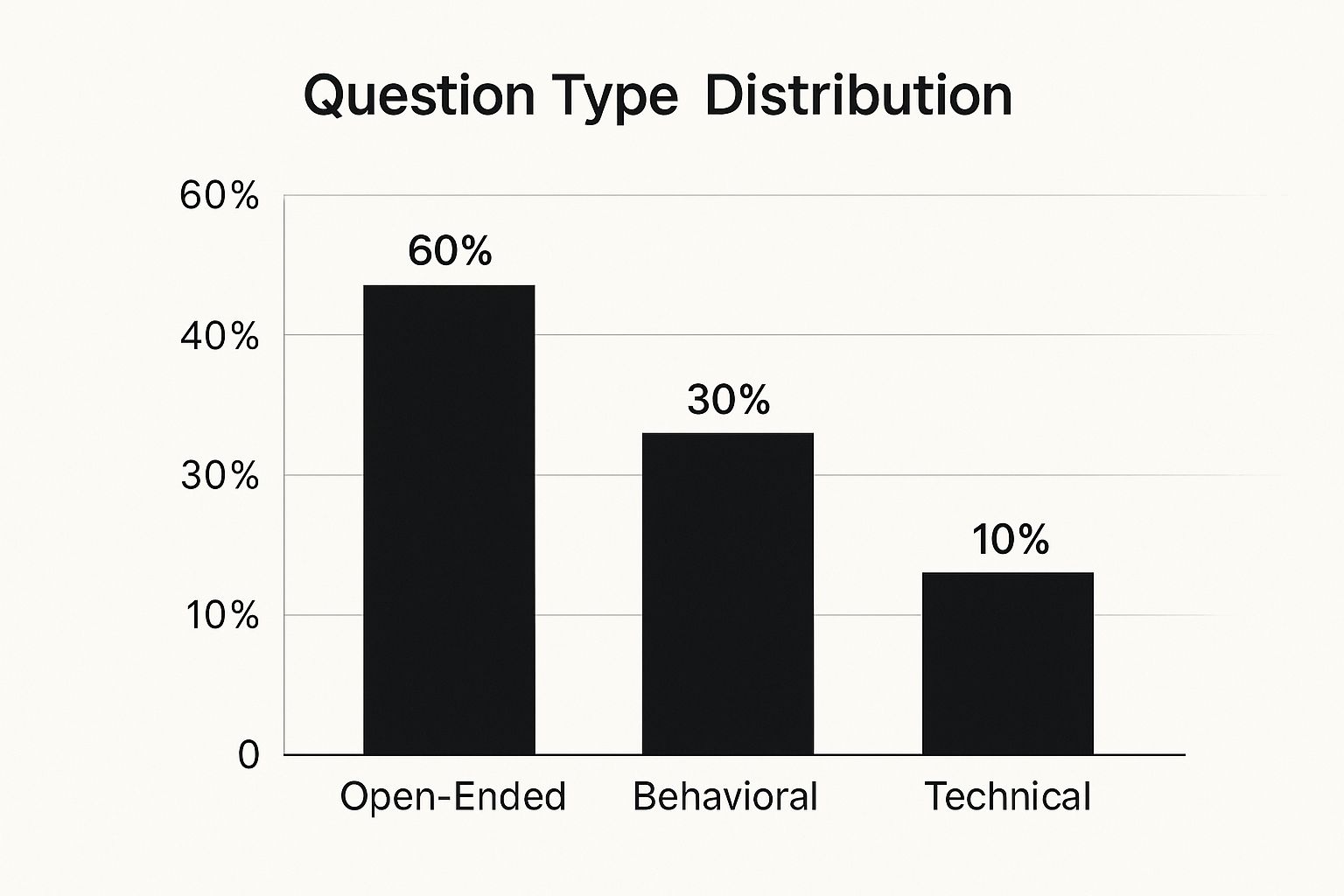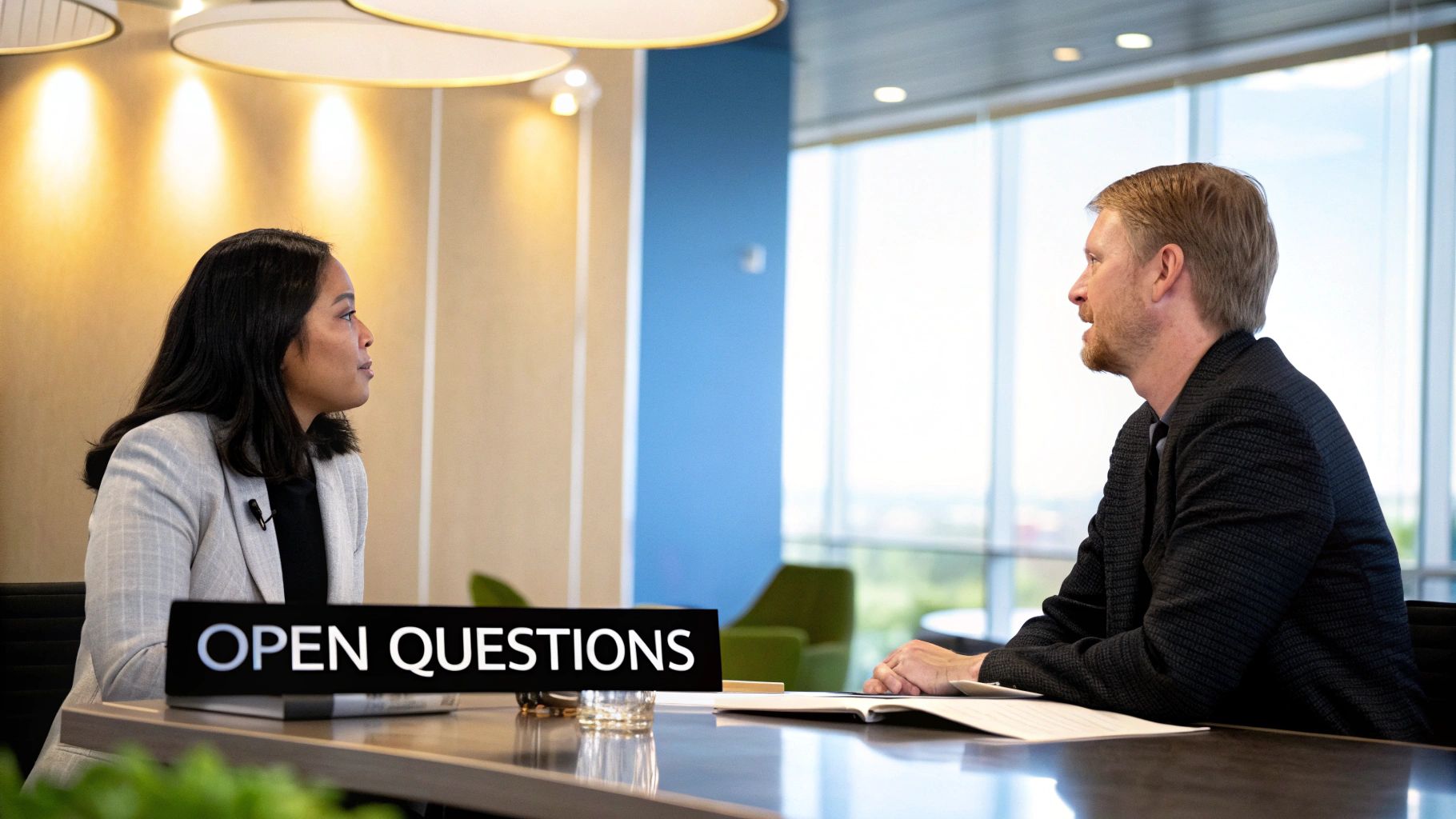How to Ask Good Interview Questions to Hire Top Talent

If you want to ask genuinely good interview questions, you have to stop asking for rehearsed answers and start asking for real-world proof. It's time to ditch "What's your greatest weakness?" and start digging into how a candidate actually handles the job.
Why Your Interview Questions Are Failing You
Let’s be honest for a second. Most of the interview questions we've all been taught to ask are broken. They often lead to a pleasant chat, but you walk away impressed by a candidate's personality, not their actual ability to do the work.
When an interview is just an unstructured conversation driven by gut feelings, you open the door to hiring someone who interviews well but can't perform. This isn't just a minor mistake; a bad hire costs you big time in lost productivity, team morale, and the money you have to spend to start the whole process over again.
The real issue is that generic questions don't predict future success. They get you theoretical responses, not hard evidence. To really master asking great interview questions, you need a more deliberate, structured approach.
The Power of a Structured Approach
A structured interview, where you ask every single candidate the same set of well-thought-out, job-relevant questions, completely changes the game. It helps strip away unconscious bias and lets you make a fair, apples-to-apples comparison between everyone you talk to. The data on this is incredibly clear.
A landmark meta-analysis covering 85 years of research found that structured interviews boost the accuracy of hiring decisions by about 34% compared to unstructured ones. Companies that made the switch also saw employee turnover drop by as much as 24% in the first year alone.
This tells us one thing loud and clear: consistency and relevance are the keys to effective interviewing. The chart below gives a great visual for how to balance your questions in a structured interview.

This kind of balanced approach ensures you're looking at the whole picture—their problem-solving abilities, past behaviors, and specific technical skills.
To see just how different these two methods are, let's break it down.
Structured vs Unstructured Interview Questioning
| Attribute | Structured Interviewing | Unstructured Interviewing |
|---|---|---|
| Consistency | All candidates are asked the same core questions in a consistent order. | Questions are spontaneous and vary widely from one candidate to the next. |
| Objectivity | Reduces interviewer bias by focusing on job-related competencies. | Highly susceptible to "gut feelings" and unconscious biases (e.g., halo effect). |
| Fairness | Provides an equal opportunity for all candidates to demonstrate their skills. | The conversation can be easily sidetracked, favoring candidates who are better conversationalists. |
| Predictive Power | High validity in predicting future job performance. | Low validity; a poor predictor of on-the-job success. |
| Efficiency | The process is streamlined and focused, making it easier to compare notes. | Can be inefficient and lead to rambling conversations that don't produce useful information. |
Ultimately, building a system for asking questions transforms your interviews from a guessing game into a reliable method for finding the best person for the job. If you're interested in digging deeper, you can find more context in these hiring statistics.
Defining What to Ask Before the Interview

The best interview questions aren't pulled out of thin air. They're carefully engineered, and the groundwork starts long before a candidate even sits down. It all begins with a deep dive into the job description. Your mission is to look past the standard list of duties and zero in on the 3-5 core competencies that truly spell success for this specific role.
Think of yourself as a detective. Don't just scan the job description—interrogate it. What are the underlying behaviors and traits that the listed skills are really pointing to? This prep work is what makes every question you ask intentional, directly linking it to a candidate's potential for on-the-job performance.
From Vague Requirements to Concrete Behaviors
Let’s walk through a real-world example. Say you're hiring a Project Manager. The job description probably lists vague requirements like "strong communication skills" and "stakeholder management." Honestly, what does that even mean? These terms are far too broad to be useful in an interview.
Your job is to translate those corporate buzzwords into observable actions. What does "strong communication" actually look like, day-to-day, for this Project Manager?
It might look like:
- Clearly explaining project risks to a non-technical executive team without causing a panic.
- Proactively sending out status updates before stakeholders even think to ask for them.
- Stepping in to mediate a disagreement between the engineering and design teams to keep things moving.
See the difference? We just transformed abstract concepts into concrete, testable scenarios. Now, instead of asking a tired question like, "Tell me about your communication skills," you can target a specific, critical behavior that actually matters.
The most effective interviewers don't just ask questions; they create scenarios. By defining the essential behaviors for a role beforehand, you shift the interview from a simple Q&A into a strategic assessment of a candidate's past performance.
Pinpointing Your Core Competencies
As you start translating these requirements into tangible behaviors, you'll notice patterns emerging. The next step is to group these related behaviors into a few core competency "buckets." This gives your interview a laser focus and keeps it from wandering off into a random collection of unrelated questions.
For our Project Manager role, those competencies might crystallize into:
- Proactive Risk Management: The knack for spotting potential roadblocks early and having a backup plan ready.
- Cross-Functional Influence: The skill to get different teams with competing priorities all pulling in the same direction.
- Executive Communication: The ability to boil down complex project details into clear, concise updates for leadership.
By defining these 3 competencies, you've just created a powerful roadmap for your interview. From here on out, every question you develop should be designed to gather evidence about a candidate's abilities in one of these specific areas. This foundational work is the secret to getting past generic interviews and consistently finding the right person for the job.
How to Craft Questions That Uncover Past Behavior

Alright, you've identified the core competencies that truly matter for the role. Now comes the fun part: writing the actual questions. Here’s a fundamental truth I’ve learned over years of interviewing: the single most reliable predictor of what someone will do is what they have done.
This is why behavioral interviewing is so powerful. Your goal is to get candidates talking about specific, real-world stories—not just theories or what they think they would do.
So, instead of asking, "How would you handle a difficult stakeholder?" you shift your approach. Ask this instead: "Tell me about a time you had to manage a difficult stakeholder." The first question invites a hypothetical, often polished answer. The second one demands proof.
The best way to get these stories flowing is to use simple, open-ended prompts. These are your secret weapons for getting candidates to open up.
- "Walk me through a time when..."
- "Describe a project where you had to..."
- "Give me an example of a situation where..."
- "Tell me about a specific instance when..."
These phrases make it incredibly difficult for a candidate to give a vague, generalized response. They have to dig into their memory and recount an actual event, which gives you the concrete evidence you need to make a solid assessment.
Tailoring Questions for Different Roles
The great thing about this framework is how easily it adapts. The core prompt stays the same, but you simply plug in a scenario relevant to the role and the competencies you mapped out earlier.
Let's look at how this plays out in a few real-world examples.
For a Sales Representative (Competency: Resilience)
- Instead of: "How do you handle rejection?"
- Ask: "Walk me through a specific time a promising deal fell through at the last minute. What did you do next?"
For a Software Engineer (Competency: Problem-Solving)
- Instead of: "How do you approach debugging?"
- Ask: "Describe the most challenging bug you've ever had to fix. What was the issue, and what was your exact process for identifying and resolving it?"
For a Customer Support Specialist (Competency: Empathy)
- Instead of: "Are you a patient person?"
- Ask: "Tell me about a time you had to help a highly frustrated customer who was upset about something that wasn't your fault. How did you handle the conversation?"
Each of these questions forces a story, not a theory. It pulls the conversation away from abstract claims ("I'm a great problem-solver!") and into the realm of tangible proof. Keep in mind that how a person tackles one challenge often gives you a window into their overall work style; it's worth digging into the consistency of a candidate's approach to see these patterns.
Helping Candidates Give You Better Answers
Even with the perfect question, you might get a rambling or incomplete answer. Most of the time, the candidate isn't trying to be evasive; they just don't know how to structure their story effectively on the spot. This is where you can step in and gently guide them with a framework like the STAR method.
The STAR method is a simple way to help candidates organize their thoughts, ensuring you get all the details you need to evaluate their experience.
A Quick Guide to the STAR MethodS - Situation: What was the background context? Set the scene.T - Task: What was their specific goal or responsibility?A - Action: What specific steps did they personally take? This is the most crucial part.R - Result: What was the outcome? Did they succeed? What did they learn? Quantify this when possible.
You don't need to formally announce, "Please use the STAR method." Think of it more as your own mental checklist. If a candidate's story feels incomplete, use the framework to ask targeted follow-up questions.
- "Can you set the scene for me? What was the project?" (Probing for the Situation)
- "And what was your specific role in that?" (Probing for the Task)
- "What were the exact steps you took to address that?" (Probing for the Action)
- "So, how did that turn out? What was the final outcome?" (Probing for the Result)
By mastering these behavioral prompts and using the STAR framework as your guide, you turn the interview from a casual chat into a structured, evidence-gathering session. This systematic process is your key to collecting high-quality data and finding the absolute best person for the job.
Uncovering Motivation and Cultural Alignment
You can hire the most skilled person on the planet, but if they don't mesh with your team's values or how you work, they're not going to stick around. This is where we need to look beyond pure technical chops and figure out what actually drives a candidate. The goal is to get a feel for their intrinsic motivators and how they'd really fit into your team's culture.
This isn't about finding clones of your current team. In fact, diversity in how people think and approach problems is a massive advantage. It's about finding people whose values and work ethic genuinely complement and elevate what you’re all trying to build together. Asking the right questions is how you discover what makes someone tick.
Gauging Intrinsic Motivation
If you want to know what truly energizes someone at work, you have to get them talking about their past experiences. Straight-up asking, "What motivates you?" almost always gets you a canned, generic answer about "loving new challenges." You have to be more clever than that.
Frame your questions to get them to tell a story about a time they felt on top of their game. For example:
- "Tell me about a work environment where you felt you were doing your absolute best work. What was it about that place that made it possible?"
- "Describe a project you were especially proud of. Forget the outcome for a second—what was it about the work itself that you found really engaging?"
- "Think about a time you went way above and beyond what was expected. What was the situation, and what made you want to put in that extra effort?"
Listen to what they highlight. Do they talk about autonomy? Constant collaboration? Structured feedback? A fast-paced, high-pressure environment? Their answers give you a blueprint of the conditions they need to thrive, and you can quickly see if that lines up with what your team actually offers.
Assessing Resilience and Coachability
How a candidate deals with a setback is just as revealing as how they celebrate a win. Someone who is resilient and open to feedback can grow with your company, but a person who gets defensive or stuck in their ways can create a lot of friction. The right questions can tell you a lot about their potential for growth.
The real test of a candidate's character isn't their highlight reel. It's how they talk about a mistake they made or how they handled tough feedback. Those stories show you their humility, self-awareness, and true potential.
Here are a few questions I've found incredibly effective for digging into these traits:
- "Tell me about a time you received some difficult feedback. How did you take it, and what did you do next?"
- "Walk me through a project that didn't go as planned. What was your role, and what was your biggest takeaway from that experience?"
- "Describe a time you had to learn a completely new skill from scratch to get something done. How did you go about it?"
Pay close attention to how they frame their stories. Are they blaming others, or are they taking ownership? A great candidate will own their part in a failure, reflect on what they learned, and show you they're focused on improving. That’s the kind of mindset that makes a team stronger over the long haul.
Using Advanced Questioning Techniques

Once you've got the hang of behavioral questions, you can start digging deeper. It's time to move into techniques that actually reveal a candidate’s thought process in real time, not just their ability to recall a rehearsed story. These methods show you how someone thinks on their feet, adapts, and solves problems right in front of you.
The real magic of an interview often happens in the moments after the candidate gives their initial answer. A simple, well-timed follow-up can turn a standard response into a genuinely revealing conversation. This is where you get past the script.
The Power of the Simple Probe
A candidate might nail the STAR method with a perfectly polished story, but there's always another layer to explore. Simple, direct probes encourage them to reflect on their own experiences, which is a fantastic way to gauge self-awareness and critical thinking.
Here are a few of my go-to follow-ups:
- "What was the specific outcome of that project? Could you share any numbers?"
- "Looking back on it now, what would you have done differently?"
- "What was the most difficult part of that situation for you personally?"
These aren't "gotcha" questions. They’re designed to test for accountability and a growth mindset. I've found that a candidate who can thoughtfully critique their past performance is often far more coachable than one who frames every story as a flawless victory.
Beyond standard interview questions, exploring advanced techniques can provide deeper insights. For instance, understanding how to pose challenging questions in a formal setting can refine your approach to interviewing, a skill that's transferable from many fields, as this resource on mastering strategic questioning explores.
Question Types and Their Purpose
Choosing the right type of question is crucial for getting the insights you need. This table breaks down common question formats and what they’re best used for.
| Question Type | Primary Purpose | Example |
|---|---|---|
| Behavioral | To assess past performance and behavior in specific situations. | "Tell me about a time you had to deal with a difficult stakeholder." |
| Situational | To evaluate future performance and problem-solving skills. | "Imagine a key project is falling behind schedule. What steps would you take?" |
| Technical/Skills | To verify specific knowledge and proficiency in required tools. | "How would you set up a conversion tracking goal in Google Analytics?" |
| Probing/Follow-up | To dig deeper into a candidate's answer and uncover their thinking. | "You mentioned you increased efficiency. What specific metric did you use to measure that?" |
| Hypothetical/Case | To assess strategic thinking and analytical abilities. | "Our user sign-ups have dropped by 15%. Walk me through how you would diagnose the problem." |
Think of these as different tools in your toolkit. Mixing them allows you to build a comprehensive picture of a candidate's abilities, from their past actions to their future potential.
Introduce Practical Mini-Challenges
Another fantastic technique is to weave a small, practical exercise right into the conversation. This isn’t a massive take-home project, just a brief, role-relevant scenario you can work through together.
For example, if you're hiring a marketing manager, you could say: "Let's imagine our latest campaign saw a 20% drop in engagement. You have five minutes to look at this mock dashboard. What are the first three things you would investigate?"
This quick exercise tells you so much:
- How they structure their thoughts under pressure.
- Their ability to prioritize actions with limited info.
- Their raw problem-solving instincts.
This gives you a much clearer signal of their on-the-job capabilities than simply asking, "How do you handle underperforming campaigns?"
The goal of an advanced interview isn't just to validate a resume; it's to simulate the job. By introducing small challenges and strategic follow-ups, you create moments that reveal a candidate’s true potential and problem-solving style.
Use Silence and Active Listening
Never underestimate the power of a strategic pause. After a candidate finishes an answer, just wait a few seconds before you jump in. It’s amazing how often they’ll use that space to add more detail or a new perspective they might have otherwise held back.
Pair this with active listening. Don't just sit there waiting for your turn to talk; tune in to the subtle cues. Listen for their tone, notice what they emphasize, and pay attention to what they don't say. Sometimes, the most important information is in the margins, and you'll only catch it if you're truly listening.
Common Questions About Interviewing
Even with the best preparation, a few practical questions always pop up when you're trying to nail down your interview process. Let’s walk through some of the things I hear most often from hiring managers.
One of the biggest questions is always, "How many questions do I actually need to prepare?" While there's no single magic number, I’ve found that having 8-10 core behavioral and situational questions in your back pocket is the sweet spot. This gives you plenty of solid material for a 45-60 minute chat, so you're not scrambling for things to ask, but it also leaves enough breathing room for follow-ups and for the candidate to ask their questions.
But what happens when you ask a great question and get a short, vague answer? Don't just move on. This is a perfect opportunity to dig a little deeper. Try a simple, encouraging prompt like, "That sounds interesting, could you walk me through that project step-by-step?" or "What was the specific result of that action?" It gently nudges them to provide the details you need without turning the conversation into an interrogation.
Handling Nerves and Awkwardness
We’ve all been there—the interview feels stilted, or the candidate is visibly on edge. It’s on you, the interviewer, to break the ice. A nervous candidate is never going to show you what they're truly capable of.
I always recommend starting with something easy. Find a project on their resume they seem genuinely proud of and ask a softball question about it. This builds instant rapport and a bit of confidence, setting the stage for them to shine when you get to the tougher questions later.
The best interviewers act more like skilled facilitators than interrogators. Their goal is to create an environment where the candidate can provide the best possible evidence of their skills and experience.
Think of it as a conversation, not a test. A great interview is also a realistic preview of the job for the candidate. For more strategies on using smart tools to improve your hiring conversations, you can find a ton of insights on the Parakeet AI blog.
Dealing with Uniqueness and Consistency
This is the big one: "How can I be fair and consistent while still digging into what makes a candidate unique?" It’s a delicate balance, but it’s achievable. The key is to start with a core set of structured questions that you ask every single candidate, no exceptions. This is your baseline for an apples-to-apples comparison.
Once you’ve covered that foundation, use the rest of your time to explore their specific background. This is where you can get personal.
- "I saw on your resume you led the migration to a new CRM. What was the biggest hurdle you had to overcome there?"
- "You have a background in neuroscience, which is fascinating. How do you think that perspective would influence your approach to this product manager role?"
This hybrid method gives you the best of both worlds. You get the structured data needed for a fair process, plus the rich, qualitative insights that come from a personalized conversation. It turns a good interview into a great one.
Are you ready to stop guessing and start making evidence-based hiring decisions? ParakeetAI is an AI-powered interview assistant designed to help you and your candidates succeed. Prepare for any question, get real-time assistance, and ace your next interview with confidence. Discover how it works at https://www.parakeet-ai.com.




